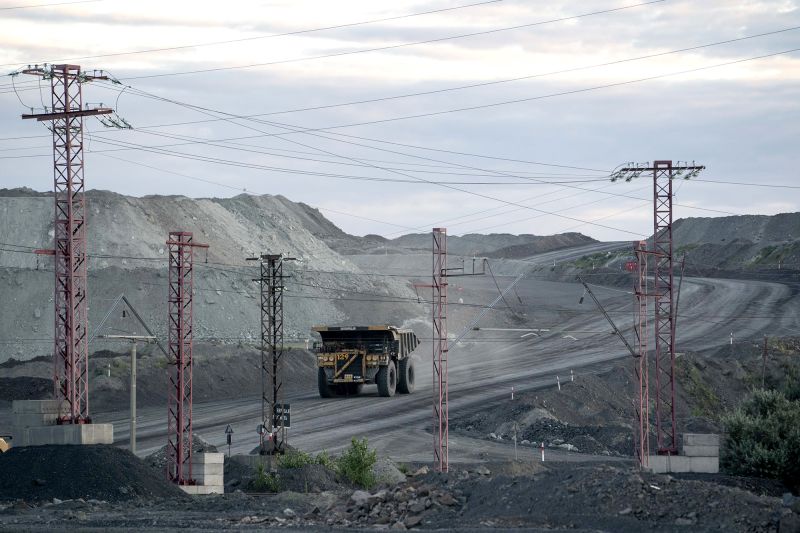
Ukraine’s mineral riches have long been eyed by its allies. Now they may be Trump’s price for military aid
US President Donald Trump has said he wants access to Ukraine’s mineral deposits in exchange for future military aid that Kyiv needs as it continues to defend itself against Russia’s aggression.
While the comment highlighted Trump’s transactional approach to the war in Ukraine, it was not entirely unexpected. The US and other Western countries have eyed Ukraine’s mineral riches for a long time.
“We’re putting in hundreds of billions of dollars. They have great rare earths. And I want security of the rare earth, and they’re willing to do (that),” Trump told reporters in the Oval Office on Monday, without specifying what, if anything, Ukraine had agreed to do.
He has previously suggested that any future assistance should be provided as a loan and would be conditioned on Ukraine negotiating with Russia.
Under former US President Joe Biden, the US had provided Ukraine with $65.9 billion in military assistance since Russia launched its full-scale invasion of the country in February 2022.
Biden argued the aid was necessary because Ukraine’s victory was key to America’s own security. Trump, however, has made it clear he doesn’t believe the US should continue providing assistance without getting something in return.
While Trump did not give any details on what he wants from Kyiv, a deal outlining a deeper cooperation between the US and Ukraine on minerals had been in the works for months before he took office in January.
A memorandum of understanding prepared under the Biden administration last year said the US would to promote investment opportunities in Ukraine’s mining projects to American companies in exchange for Kyiv creating economic incentives an implementing good business and environmental practices.
Ukraine already has a similar agreement with the European Union, signed in 2021.
Adam Mycyk, a partner in the Kyiv office of the global law firm Dentons, said that while the objective of the deal – securing critical mineral supplies from Ukraine – remains unchanged, Trump’s approach seems to be more transactional.
Kyiv has not yet responded to Trump’s comments, but the Ukrainian government has in the past made the argument that its mineral deposits are one of the reasons the West should support Ukraine – to prevent these strategically important resources from falling into Russian hands.
Ukraine’s President Volodymyr Zelensky has specifically mentioned the possibility of future investments in the country’s natural resources by its Western allies as a key part of his “Victory plan.”
“The deposits of critical resources in Ukraine, along with Ukraine’s globally important energy and food production potential, are among the key predatory objectives of the Russian Federation in this war. And this is our opportunity for growth,” Zelensky said in a statement outlining the plan in October.
Nataliya Katser-Buchkovska, the co-founder of the Ukrainian Sustainable Investment Fund, said a deal that would bring US investment into Ukraine’s mining sector would be beneficial for both sides.
The US largely depends on imports for the minerals it needs, many of which come from China. Of the 50 minerals classed as critical, the US was entirely dependent on imports of 12 and more than 50% dependent on imports of a further 16, according to the United States Geological Survey, a government agency.
Ukraine, meanwhile, has deposits of 22 of these 50 critical materials, according to the Ukrainian government.
“It is not only a crucial step for Ukraine’s post-war economic recovery, but it’s also a chance for the US to address global supply chain issues,” said Katser-Buchkovska, who served as a member of the Ukrainian Parliament from 2014 to 2019 and was the head of a parliamentary committee on energy security and transition.
China’s global dominance
Although Trump used the term “rare earths,” it is unclear whether he intended to refer specifically to rare earth minerals – a group of 17 elements that exist in the earth’s core and have magnetic and conductive properties that make them crucial to the production of electronics, clean energy technologies and some weapon systems.
Ukraine doesn’t have globally significant reserves of rare earth minerals, but it does have some of the world’s largest deposits of graphite, lithium, titanium, beryllium and uranium, all of which are classed by the US as critical minerals. Some of these reserves are in areas that are currently under Russian occupation.
China has long dominated the global production of rare earths minerals and other strategically important materials. It is responsible for nearly 90% of global processing of rare earth minerals, according to the Center for Strategic and International Studies (CSIS). On top of that, China is also the world’s largest producer of graphite and titanium, and a major processor of lithium.
The latest trade spat between Washington and Beijing makes it even more important for the US to look for alternative suppliers.
The economic measures China announced on Tuesday in retaliation for Trump’s new tariffs include new export controls on more than two dozen metal products and related technologies. While they do not cover the most critical materials the US needs, the move indicates that China is prepared to use its mineral riches as leverage in trade disputes.
Mycyk said that the demand for these critical materials is expected to surge because of the global transition to electric vehicles and renewable energy technologies.
“Ukraine’s deposits are thus globally significant, offering diversification away from dominant producers like China. Keeping these resources under Ukrainian control is crucial for maintaining its economic sovereignty,” he added.
